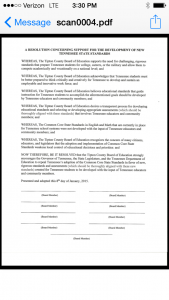Though she didn’t make it to the Final Four in Education Commissioner Madness, Lipscomb University Senior Vice President Candice McQueen looks to be Governor Haslam’s choice to serve as Tennessee’s next Commissioner of Education. This according to Joey Garrison at the The Tennessean.
In addition to serving as Senior Vice President at Lipscomb, McQueen is the Dean of the College of Education at the school.
Here’s more on McQueen from her bio at Lipscomb:
Dr. Candice McQueen was appointed as a Senior Vice President at Lipscomb University in January 2014 where she also serves as the Dean of the College of Education. In her new senior role, McQueen serves on the executive leadership team of the university and oversees both her college and the 1,300 Pre-K-12th grade students in three schools at Lipscomb Academy – the largest private school in middle Tennessee.
McQueen’s college and teacher preparation programs have been highlighted at both the state and national levels for excellence in both teacher preparation design and teacher candidate outcomes. The programs in McQueen’s college have been consistently highlighted as one of the top teacher training programs in the state of Tennessee for quality and effectiveness based on the Tennessee Report Card on the Effectiveness of Teacher Training Programs and was most recently pointed out as the second highest ranking program in the nation by the National Council on Teacher Quality. In addition, in her six years as dean, the college has grown by 54% with 72% growth at the graduate level while adding 15 new graduate programs, including a doctorate, and creating innovative partnerships that focus on collaborative design and delivery for coursework and programming.
In 2012, McQueen and the College of Education partnered with the Ayers Foundation to initiate The Ayers Institute for Teacher Learning and Innovation. The institute has a focus on supporting higher academic standards, embedded professional learning and new approaches to leadership training and support. The institute initially partnered with the Tennessee Higher Education Commission to create pre-service teacher resources and web-based videos on teachers modeling the usage of college and career readiness standards. Tennessee’s higher education institutions and alternative preparation programs are currently utilizing the resources to prepare new teachers and leaders. Also, many Tennessee school districts and other states are using the resources for professional development. In addition, the institute’s innovative MOOCs (massive open online courses) in teacher preparation were recently released. The first three MOOCs released in September and October 2014 already have almost 10,000 users.
Before coming to Lipscomb and serving as a department chair, Dr. McQueen taught in both private and public elementary and middle schools where she was awarded multiple awards for both her teaching and the curriculum design of a new magnet school. Dr. McQueen has a bachelor’s degree from Lipscomb, a master’s degree from Vanderbilt, and a Ph.D. from the University of Texas.
McQueen has been a strong supporter of Common Core, testifying before state legislators on the issue. She also spoke about the standards and their importance at Governor Haslam’s Education Summit held earlier this year.
Tennessee Education Association statement on McQueen:
“TEA looks forward to working with Dr. McQueen to provide a quality public education to every student in Tennessee,” said Barbara Gray, Shelby County administrator and TEA president. “We hope she will listen to veteran educators in the state when making important policy decisions. The people who work with children in the classroom every day are the real experts and should have a significant voice in decision-making at the state level.”
“TEA is hopeful she will use this new position to forcefully advocate within the administration to improve per student investment in Tennessee,” the TEA president continued. “As a former educator herself, I’m sure she agrees that it is unacceptable for our state to rank below Mississippi in what we invest in our children.”
Professional Educators of Tennessee statement on McQueen:
We look forward to working with Dr. McQueen on critical education issues facing Tennessee Educators. Dr. Candice McQueen is well versed in the hard work teachers’ face every day as she has taught in both private and public elementary and middle schools. She is familiar with Tennessee, one of our major concerns. “We have admired Dr. McQueen’s work from afar, and are looking forward to working with her more closely,” said Executive Director J. C. Bowman. Priorities for a new commissioner must first be student-centered. Our students must have the resources and innovative instruction to compete in a world-class economy right here in Tennessee. We are reminded that the working conditions of our educators become the learning environment of our students, therefore teachers must also be a high priority in the new commissioner’s agenda. Finally, Tennessee will need to continue to allocate resources devoted to the transition of standards. As we have maintained, we believe it is time to move beyond the Common Core debate. We need to continuously build state specific standards that are challenging and meet the needs of Tennesseans. This needs to be done with legislative input and with the involvement of Tennessee educators. In this season of hope, we truly look forward to working with Dr. McQueen to move our state forward.
For more on education politics and policy in Tennessee, follow @TNEdReport
